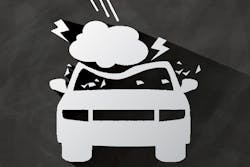On April 12, a hail storm that would later be called the costliest act of nature in the history of Texas roared through the San Antonio area. Clay Fallis had never seen anything like it. And he knows hail.
Fallis is the owner of the three-location, San Antonio–based ProCare Automotive & Collision, which recently merged with Ellis & Salazar Garage & Body Shop, a six-facility MSO in the Austin area. The nine-shop network has seen its fair share of weather-related work, but nothing like this April storm.
“The cars that came in didn’t look like typical hail damage,” Fallis adds. “It looked like someone had gotten angry and taken a baseball bat to all of these cars.”
Fallis estimates that 150,000 cars were affected by the storm in the San Antonio area. Although the MSO had three stores total that were in the affected area, Fallis set up a PDR tent at his Fairdale Drive location—and had 150 hail damaged vehicles at his facility within two weeks. In addition to the workload, Fallis also had to deal with the $200,000 worth of hail damage to his buildings and vehicles already on his lot.
His team quickly became overwhelmed with work, and Fallis and the rest of the ProCare crew had to create a plan and create it quickly. The experience taught Fallis a number of lessons on how to handle a severe weather catastrophe, and while the MSO’s workload is slowly returning to normalcy, ProCare and Ellis & Salazar now have a firm process for handling the most daunting of storms.
Create a Scheduling Method
With the amount of hail-damaged cars that were coming in, Fallis’ Fairdale shop had to quickly determine how to schedule the work. Fallis and his team decided to create a schedule based on how many cars they thought they could work on each day. Then, they gave customers a date that their vehicles would be worked on based on that. Looking back, Fallis says it would have been more efficient to use a number system rather than scheduling dates.
“It was trial and error. We weren’t sure how long the work would actually take, so we guessed,” Fallis explains. “The problem with giving customers a date was we had to keep pushing it back. If we told a customer they should come in on May 5, we would have to keep calling and rescheduling.”
With a number system, a customer with the number 30 would be called to bring their vehicle in when 29 jobs were completed. Fallis thinks the number system would have cut down on bottlenecks in the paint department and also eliminated the problem of rescheduling customers.
Designate a Work Space
Another lesson that Fallis has learned from this situation is to rent out a facility and do all of the hail work offsite. Fallis said that the amount of hail damage work at the shop was taking the shop away from its moneymaker: collision work. Fallis said if a severe weather situation happens again, they’ll take all of that work to an offsite facility to prevent bottlenecks and maintain regular workflow at the shop.
“The main thing is we don’t want to lose focus on our bread and butter, which is collision,” Fallis says. “Renting an offsite facility would allow us to keep that focus.”
Handle Supplements First
The MSO started by taking in whatever vehicle came in first. Fallis says that if he had it to do over again, he would only take in vehicles once the paperwork was complete and the supplements were taken care of.
Establish a Communication Center
The massive amount of hail-damaged vehicles made it impossible to handle all of the work in one location. The MSO had to send work to other locations in order to meet the demand. Ellis & Salazar and ProCare set up a joint call center at its headquarters in New Braunfels. Phone calls could be directed to the call center, which meant that the shop could concentrate on repairing vehicles while the call center dealt with scheduling jobs and communicating with customers. Fallis says that the communication center worked well and is something that he would do again.
Maintain Customer Service
After the storm hit, everything happened at once. Fallis said insurance companies called right away with the hail damage companies that would work with them. Adjustors were brought in and tents were set up to accommodate all of the people. Customer service has always been important to Ellis & Salazar and ProCare, and Fallis wasn’t going to change that.
“Having that many customers come in and ushering them through tents felt a little bit like treating them like cattle,” Fallis says. “We weren’t going to do that. I decided we were going to have a BBQ.”
By providing food and beverages to the customers that were waiting, the shop turned a horrific event into something more positive.
Another thing that the shop did was shuttle customers back to their homes. When the storm hit, it hit everything—including the shop’s car rental company. Fallis said the shop designated a couple people from its staff to shuttle customers back to their homes once they dropped their vehicles off.
The most important thing Fallis says the shop did was creating a script for how to deal with customers. The customers coming into the shop were experiencing a lot of stress. By discussing what to say, the staff was able to empathize with the customer and communicate all of the necessary information.
“I would explain to customers how bad the storm was and that it was the first time we had ever dealt with anything like it,” Fallis says. “We would explain exactly what their options were. We walked them through the process of what we would be doing, what their insurance company would do, and what they would need to do.”
Fallis adds that for customers who didn’t understand how long it would take, he would share with them that the same thing was going on with his house, which was hit with $30,000 worth of damage. Fallis says that when he explained his situation, most customers understood the situation better and could relate.
Invest in Training
Even though Fallis and his staff had never been through anything like it, he says they were well-prepared to handle a stressful situation thanks to leadership training. The management staff of the MSO had taken leadership training courses prior to the storm and Fallis said the training helped them deal with the extra workload and helped the staff deal with the added stress.
“Leadership training really opens you up. It’s your choice how to deal with a situation,” Fallis says. “It’s not about good news or bad news; it’s all just news. I learned that it’s all about how I interpret that news.”
Prepare for the Worst
Before this year, hail storms of this magnitude were not something that Fallis had to deal with. Being hit with something so unexpected has taught him to be prepared for anything. The MSO has created a plan for what to do if it ever hits again and will use the experience of what worked and what didn’t to create a better process.

